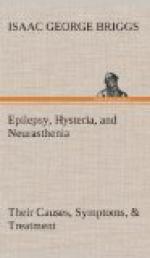“He raves, since Soul and Spirit
are alike
Disturbed throughout, and severed each
from each
As urged above, distracted by the bane;
But when at length the morbid cause declines,
And the fermenting humours from the heart
Flow back—with staggering foot
first treads
Led gradual on to intellect and strength.”—Lucretius.
Epilepsy, or “Falling Sickness”, is a chronic abnormality of the nervous system, evinced by attacks of alteration of consciousness, usually accompanied by convulsions.
It attacks men of every race, as well as domesticated animals, and has been known since the earliest times, the ancients imputing it to demons, the anger of the gods, or a blow from a star.
It often attacks men in crowds, when excited by oratory or sport, hence the Roman name: morbus comitialis (crowd sickness).
In mediaeval times, sufferers were regarded with awe, as being possessed by a spirit. Witch doctors among savages, and founders and expounders of differing creeds among more civilized peoples, have taken advantage of this infirmity to claim divine inspiration, and the power of “seeing visions” and prophesying.
Epilepsy has always interested medical men because of its frequency, the difficulty of tracing its cause, and its obstinacy to treatment, while it has appealed to popular imagination by the appalling picture of bodily overthrow it presents, so that many gross superstitions have grown up around it.
The description in Mark ix. 17-29, is interesting:
“Master, I have brought Thee my son, which hath a dumb spirit. And wheresoever he taketh him, he teareth him: and he foameth, and gnasheth with his teeth, and pineth away: ... straightway the spirit tare him; and he fell on the ground, and wallowed foaming.
“And He asked his father,
How long is it ago since this came unto him?
And he said, Of a child.
And ofttimes it hath cast him into the fire,
and into the waters, to destroy
him.
“And he said unto them,
This kind can come forth by nothing, but by
prayer and fasting.”
Up to the present, epilepsy can be ascribed to no specific disease of the brain, the symptoms being due to some morbid disturbance in its action. Epilepsy is a “functional” disease.
Grand mal ("Great Evil”)
An unusual feeling called an aura (Latin—vapour), sometimes warns a patient of an impending fit, commonly lasting long enough to permit him to sit or lie down. This is followed by giddiness, a roaring in the ears, or some unusual sensation, and merciful unconsciousness. In many cases this stage is instantaneous; in others it lasts some seconds—but an eternity to the sufferer. This stage is all that victims can recall (and this only after painful effort) of an attack.
As unconsciousness supervenes, the patient becomes pale, and gives a cry, which varies from a low moan to a loud, inhuman shriek. The head and eyes turn to one side, or up or down, the pupils of the eyes enlarge and become fixed in a set stare, and the patient drops as if shot, making no effort to guard his fall, being often slightly and sometimes severely injured.




